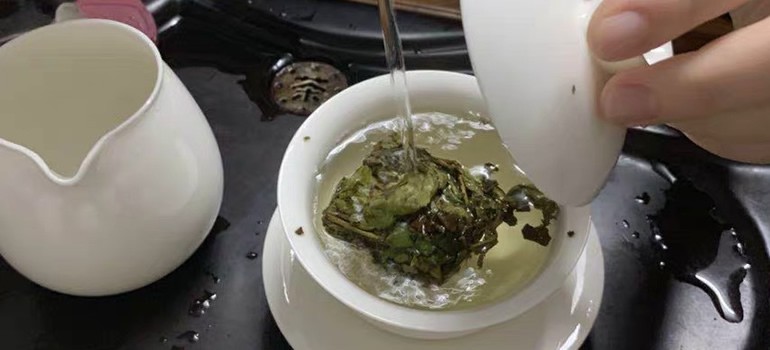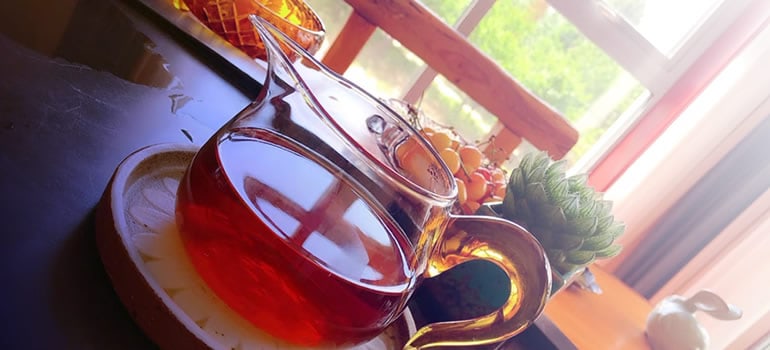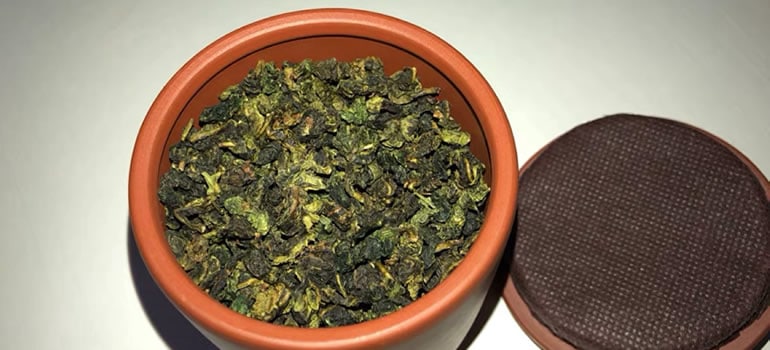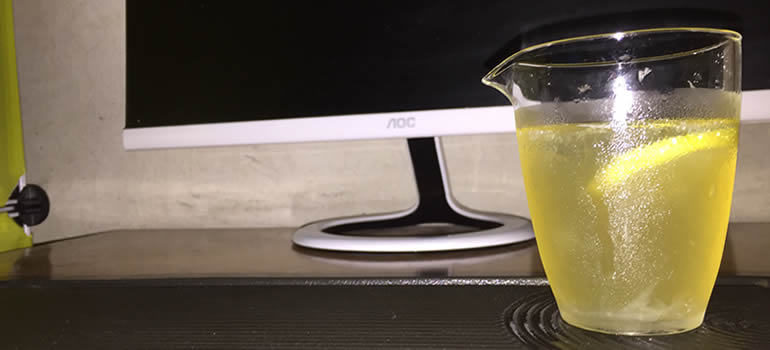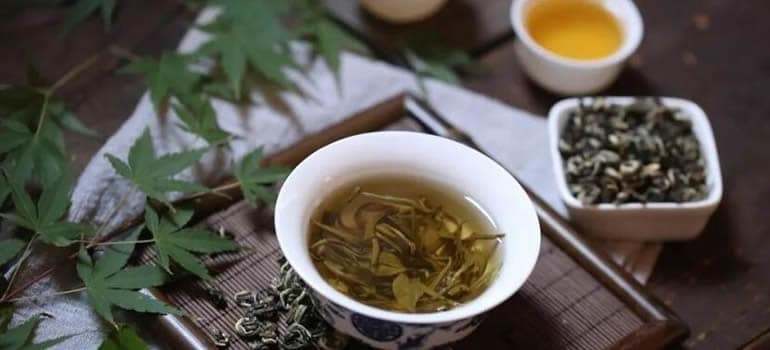
It is that time of the day.
You can finally relax. Maybe you have a book handy, or you just want to enjoy an episode of your favorite show.
You grab the cup of tea you have just prepared, take a sip, and oh goodness me. It is so bitter that you are now rethinking your life choices.
Well, maybe it is not that bitter. But I’ve had my fair share of unexpected tea surprises. And maybe you have too. So why is that?
Why does tea get bitter, and how to fix it? Tannins are responsible for the bitter taste of your tea. The higher amounts of tannins in your tea, the more bitter it is. Steeping and brewing your tea for too long or at very high temperatures is also going to make it more bitter.
In this article, we will explore how the different compounds and elements found in tea affect its taste. Don’t worry; we will not be getting unnecessarily sciency and technical.
There are, indeed, a lot of things that happen and take place in your small cup of tea. You just need to know a few things in order to ensure all your cups of tea taste the best. So let’s dive in.
What Components Are Responsible for the Taste of My Tea?
The chemical compounds in tea leaves are the ones responsible for their taste.
In addition to that, the processing methods used in the preparation of the tea leaves are also going to be responsible for its taste and bitterness.
By using different processing methods, different amounts of oxidation and varying ranges of withering manufacturers have found that they can produce different types of tea each with its unique flavor and aroma, despite the ingredients being the same – the Camellia sinensis plant.
Polyphenols
Polyphenols are the main component that will dictate the taste and bitterness levels of tea. Polyphenols are created as a defense mechanism by plants against other predators in nature like animals and insects.
There are more than 8,000 different types of polyphenols which then separated into four different categories: flavonoids, phenolic acids, polyphenolic amides, and other polyphenols.
Minerals
There is a great variety of different minerals that can be found in the tea. The most common are potassium, manganese, phosphorus, and calcium.
These minerals are going to play a role, even if it is a small one, in the actual taste of the tea as well.
Amino Acids
Amino acids are also known to affect the taste of tea. Amino acids make the tea taste more sweater.
An interesting fact is that tea that has been grown in the shade is going to have a high amount of amino acids. In some cases, you can have as much as four times as many amino acids.
Caffeine
Caffeine is another substance that is found in all the ‘true’ teas – the ones made from the Camellia sinensis plant. Depending on the processing methods, variety of tea, and the amount of oxidation, the different types of tea will generally contain different amounts of caffeine.
And caffeine will have a big say in how bitter your cup of tea will taste: the higher the caffeine amount, the more bitter tea.
What Causes Tea to Get Bitter?
Long Steep Time
One of the things that makes tea amazing is the simple fact that by doing some small changes in its preparation, you can play around with its taste and flavors.
When you start steeping your tea, the first few minutes is when most of the caffeine is extracted. This means that steeping your black tea even for two minutes is going to be enough to have a good caffeine-rich drink.
After these first two minutes, the tannins and theanine start to leach into the water. And the longer you steep your tea, the higher their content will be. And more tannins and theanine will mean more bitter tasting tea.
High Steeping or Brewing Temperatures
The temperature at which you steep or boil your tea is going to be the factor that may be very hard to get the hang of. For example, I may not have any means of checking the temperature of the water.
And if the water is not hot enough, this will result in a tea that may taste very bland and lack any flavor.
While using water that has too high of a temperature may practically ruin my cuppa by making it taste really bitter.
Your Genes
Interestingly enough scientists have found that, indeed, your genes may play a role in how bitter flavors taste to you.
There are a specific group of receptor genes in our body that are connected with the perception of bitter substances.
It was also discovered that the different people have different ratios of these receptor genes in their body. And this ratio is responsible for which one – tea or coffee – we are more likely to enjoy consuming regularly.
Old Tea
If your tea tastes bitter despite doing everything possible to avoid that this may mean that the tea may have gone bad.
Make sure you store your tea properly in a cool and dry place without direct sunlight.
Tea Variety
Although the different varieties and types of tea will contain relatively the same nutrient and compound the actual proportions and ratio of these elements will vary.
Some tea will have higher amounts of tannins, and others may have more caffeine in them or even both. This can make one tea taste nutty and earthy while another of the same kind very astringent.
How to Make Your Tea Taste Less Better
We have gone through the most common reasons why tea will taste bitter. Now let’s take a look at what you can actually do to fix that.
Steeping and Brewing Time
You can reduce the amount of bitterness of your tea by steeping it for no more than three to five minutes.
This will limit the amount of tannins that will be released in your tea.
Steeping and Brewing Temperatures
The temperature of the water is where all the magic happens.
This is how we bring out the taste of our tea. Which also means that this is where often things can go wrong and make our tea a lot bitter.
As a general rule of thumb:
- Green and White tea should be brewed and steeped at 170 to 185 F;
- Oolong tea should be brewed and steeped at 180 to 190 F; and
- Black tea should be brewed at 208 to 212 F.
You can also have a vague idea of whether or not the water has reached a good temperature by looking at the bubbles that are forming on its surface.
Keep in mind that this may be considered a shot in the dark, but it can still work as a make-do option.
- Tiny bubbles for green tea;
- Slightly bigger water bubbles for oolong; and
- Big water bubbles for black tea.
Tea Variety
Also, consider the type and variety of tea.
The higher the caffeine content and the higher tannin content are going to lead to a generally speaking to a more bitter tasting tea all else being equal.
For example, although black tea has a more malty taste, it also has a higher caffeine content making it slightly more bitter. And if brewed and steeped for longer it can quite easily get into dangerously bitter territories.
Should I Add Milk to Make It Taste Less Bitter?
Milk is a rather popular ingredient added to the tea. In fact, one study has discovered that nearly 34% of British people like their tea with milk.
Admittedly milk will make your tea a bit better tasting, but it may not be a good idea, especially if you want to take full advantage of tea’s health properties. Here’s why.
The great majority of the tea’s health benefits come from the antioxidant content in it. But the casein in milk (which is a type of protein) is known to interact with these antioxidants.
As a result adding, even a little milk may completely eliminate the beneficial properties of your tea.
Is Bitter Tea Good for Us?
We can drink tea for various reasons. Many of us do it to stay healthy. Others do it because of its flavor and aroma. Many people actually enjoy the bitter taste of tea.
You may see some people leave the tea bag in their cup for longer or even squeeze their tea bag in order to extract every last bit of the bitter-tasting tannins in it.
But is a bitter tea going to be a better tea?
Well, maybe. Tannins are not considered bad per se. They are believed to have very strong antioxidant properties which can help our body stay healthy.
And if we take a look at caffeine, it too is known to have strong energy-boosting properties. And it is believed to have numerous beneficial properties.
So just because tea is bitter maybe it doesn’t necessarily mean it is bad. However, everything needs to be consumed in moderation, especially caffeine.
Resources:
https://www.sciencelearn.org.nz/resources/1661-the-science-of-tea
https://www.ncbi.nlm.nih.gov/pubmed/16185212
https://bmcgenomics.biomedcentral.com/articles/10.1186/s12864-018-5058-2
https://www.theguardian.com/science/2007/jan/09/medicalresearch.medicineandhealth
www.healthline.com/nutrition/polyphenols
https://www.itoen-global.com/allabout_greentea/components_benefit.html

